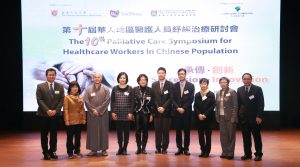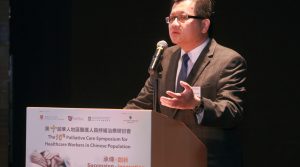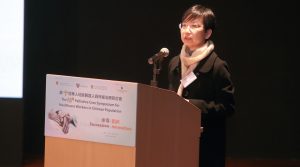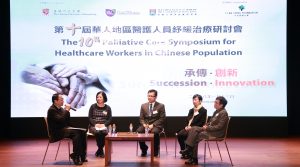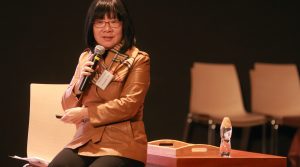The 10th Palliative Care Symposium for Healthcare Workers in the Chinese Population was held at the Tsz Shan Monastery on January 13. There were over 180 participants from different professions, including medical practitioners, nurses and representatives of service providers. The symposium was jointly organised by the Faculty of Medicine at The Chinese University of Hong Kong (CUHK), the Li Ka Shing Faculty of Medicine at The University of Hong Kong (HKU) and the Li Ka Shing Foundation “Heart of Gold” Hong Kong Hospice Service Programme.
Under the theme of “Succession‧Innovation”, this year’s symposium provided an excellent platform for participants to review the development of local palliative care services in the past decade and share their experiences. They also discussed collaboration between different professional bodies in order to prepare for the challenges ahead.
Prof. Albert Martin Man Chim LI, Assistant Dean (Education) of the Faculty of Medicine at CUHK, Dr. Chi Wai CHEUNG, Assistant Dean (Private Sector Liaison) of the Li Ka Shing Faculty of Medicine at HKU, Dr. Katherine LO, Senior Project Manager of Li Ka Shing Foundation and the Venerable Shi Tian Wen, Master Lecturer of Tsz Shan Monastery officiated at the opening ceremony of the event.
Prof. Albert Martin Man Chim LI remarked, “Medical staff from different regions and with different backgrounds can exchange their experiences in palliative care services at the annual symposium. This helps promote medical education and research in the field and strengthens care and support for patients with advanced diseases. We hope this will eventually benefit more patients and the entire Chinese community.”
Dr. Chi Wai CHEUNG stated, “The demand for palliative care services is ever increasing with the ageing population in Hong Kong. The experiences and thoughts of practitioners in this field are essential for improving service quality. We hope by organising the symposium, knowledge can be passed on to the next generation and allow young healthcare professionals to better understand how to treat and serve patients and their families from their perspectives and feelings.”
The Venerable Shi Tian Wen stated, “The core belief of Buddhism is to achieve happiness and peace of mind through overcoming suffering. By providing spiritual care, life and death education and appropriate skills training, we aim to equip our volunteers who will be engaging in caregiving for the elderly and patients, and their families as well. This symposium is indeed as a great opportunity for us to improve collaboration between the medical sector and service providers to ensure we achieve our shared goal of providing the best care for the community.”
One of the keynote speakers, Dr Tai Chung LAM, Clinical Assistant Professor from the Department of Clinical Oncology of the Li Ka Shing Faculty of Medicine at HKU, conducted a territory-wide review on the local palliative care service to analyse its development over the past decade and estimate the unmet need. “By reviewing data of 2,800 patients across all seven service clusters of the Hospital Authority in the past 10 years, we can find the trend in palliative care coverage, palliative care outcome and health care service utilisation for patients with advanced cancer. The data will be essential to guide service planning, which will echo the Strategic Service Framework for Palliative Care published by the Hospital Authority in 2017 which is the guide to the development of palliative care services in the next five to ten years.”
Medical professionals are striving to explore ways to enhance the quality of palliative care services. The other keynote speaker, Dr Rebecca Mei Wan YEUNG, Chief of Service of the Department of Clinical Oncology at the Pamela Youde Nethersole Eastern Hospital, spoke of her ideas on how to make innovations in conventional practice by applying palliative care to oncology treatment. “In traditional practice, patients are referred for palliative care after they have run out of active oncological treatments. However, there is growing evidence that early integration of palliative care with oncology treatment can bring out clinical benefit, including survival gain.”
Dr Jennifer Shui Wa YIM, Centre-in-charge of Tsz Shan Monastery Spiritual Counselling Centre, spoke in the plenary lecture that the Centre has helped over 20,000 people who were in need of spiritual counselling, since it opened in April 2015. “We set up this first Buddhist Spiritual Counselling Centre in Hong Kong with the hope of assisting people in regaining control over their lives through Buddhist wisdom with the professional counselling services provided by our social workers and counsellors.”
About the Palliative Care Symposium for Health Care Workers in the Chinese Population
This annual symposium is co-organised by the two local medical faculties and sponsored and supported by the Li Ka Shing Foundation. The Foundation aims to contribute to society by helping those in need to build a better life. Its munificent support in healthcare has benefited countless patients in Hong Kong, Mainland China and worldwide. In 1998, the Foundation pioneered free hospice care services in the Mainland with the establishment of the “Heart of Gold” Hospice Service Programme. The Foundation’s total donation of over HK$800 million has supported 42 hospice centres in the Mainland and Hong Kong, benefitting over 210,000 cancer patients.
Media Enquiries:
Ms. Jackie Chan, Assistant Communications Manager, Faculty of Medicine, CUHK (Tel: 3505 4375)Ms. Florence Cheng, Assistant Manager (Knowledge Exchange & Faculty Advancement),
Li Ka Shing Faculty of Medicine, HKU (Tel: 3917 9995 / 9107 1676)

